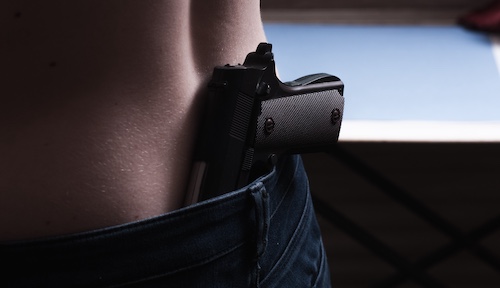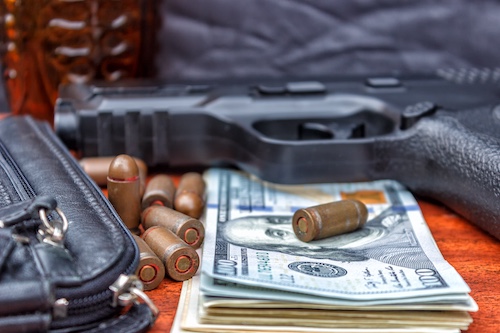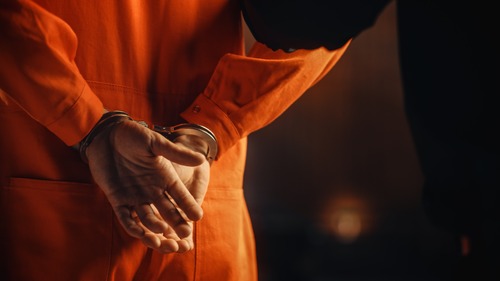Accused of Illegal Possession of a Firearm in Texas?
Facing federal gun charges is serious. If you are accused of illegal possession of a firearm, the consequences can include prison time, a permanent felony record, and the loss of your right to own weapons. Both federal law and the Texas Penal Code impose strict rules on who may lawfully possess firearms and under what conditions. Whether the charge involves a prior felony conviction, a controlled substance offense, or a restricted weapon, the stakes are high.
In this blog, you will learn what qualifies as illegal possession of a firearm, how federal charges differ from state charges, the situations that trigger federal prosecution, the penalties you could face, and why working with an experienced gun charges attorney in The Woodlands is essential to protect your rights.
What Counts as Illegal Possession of a Firearm?
Understanding what qualifies as illegal possession of a firearm is critical if you are facing charges in Texas. This section breaks down who cannot lawfully possess a firearm and under what conditions possession becomes a criminal offense.
Felons in Possession of a Firearm
Under Texas Penal Code § 46.04, a person who has been convicted of a felony commits a crime if they possess a firearm. This restriction applies until five years have passed after the person’s release from confinement or supervision, whichever date is later. Even after that period, possession is only legal on the person’s private property.
Firearm Possession and Controlled Substances
Federal law, under 18 U.S. Code § 922(g)(3), makes it illegal for a person who is an unlawful user of a controlled substance to possess firearms. This includes drugs listed in state and federal schedules, even if no active use occurs at the time of arrest. Law enforcement may use other evidence, such as drug tests or witness statements, to prove drug use.
Mental Health Restrictions
A person who has been adjudicated as a mental defective or committed to a mental institution is prohibited from firearm possession under 18 U.S. Code § 922(g)(4). This applies to both voluntary and involuntary commitments. The law assumes such individuals pose a risk to public safety.
Persons Under Protective Orders
If a person is subject to a court-issued protective order involving a threat to an intimate partner or the partner’s child, they may not possess firearms during the duration of the order. This is outlined in 18 U.S. Code § 922(g)(8). Violating this order leads to federal gun charges and additional criminal charges under state law.
Dishonorable Discharge from the Armed Forces
Federal law bars any person dishonorably discharged from the armed forces from possessing firearms. This disqualification is based on concerns over conduct and reliability. It also applies regardless of the amount of time that has passed since the discharge.
Non-Citizens and Immigration Status
Certain immigration statuses also prevent legal possession. Under 18 U.S. Code § 922(g)(5), undocumented persons or those in the country unlawfully cannot legally possess firearms. Lawful permanent residents are generally permitted, unless barred for another reason such as a felony conviction.
Persons Convicted of Domestic Violence
A misdemeanor conviction for a domestic violence offense prohibits firearm possession. This includes crimes involving physical force or a deadly weapon committed against a spouse, partner, or member of the person’s family.
Juveniles and Age Restrictions
Federal law also restricts possession based on age. A person under 18 cannot lawfully possess a handgun unless under the supervision of a parent, guardian, or instructor. Texas law aligns with these provisions, with some added exceptions for hunting or lawful sporting purposes.
Federal vs. State Gun Charges
Understanding the difference between federal and state gun charges helps you see how cases are handled and which penalties apply. Both systems have separate laws, procedures, and consequences.
Jurisdiction and Authority
Federal law applies when a firearm crosses state lines, involves federal property, or relates to other federal crimes such as drug trafficking. Agencies like the ATF and FBI handle these cases. State law applies when the crime occurs within Texas and does not trigger federal involvement. Local police and county prosecutors handle most state-level charges.
Differences in Law
Texas gun laws are defined in the Texas Penal Code, including offenses like unlawful possession by felons under § 46.04 and unlawful carrying under § 46.02. Federal gun laws come from 18 U.S. Code § 922 and related sections. These include broader restrictions, such as those involving mental defectives, dishonorable discharge, or controlled substance use.
Common Federal Gun Offenses
Federal gun charges often involve possession during another crime. One example is possession of a firearm in furtherance of a drug trafficking crime under 18 U.S.C. § 924(c). Other charges include shipping firearms across state lines or possessing restricted weapons like a machine gun or armor piercing ammunition.
State-Level Gun Offenses
Texas charges include carrying without a license, possessing firearms in prohibited places, and possession by persons under protective orders. A Class A misdemeanor may apply for unlawful carry, while third degree felonies apply to possession by a convicted felon or certain weapon possession under Texas Penal Code § 46.05.
Penalties and Sentencing
Federal sentences follow strict guidelines and usually include prison time with fewer alternatives like probation. Sentences can increase if the firearm is used in a crime involving bodily injury or death. Texas law allows for community supervision and mandatory supervision in some cases, depending on the offense and criminal history.
When Federal Charges Apply
Federal charges often follow joint investigations. A person may be charged federally if they possess a firearm while committing a crime punishable by more than one year, belong to a criminal street gang, or are a prohibited person. Federal authorities decide which cases meet their standards for prosecution.
Why the Difference Matters
The system that charges you determines the rules, defenses, and potential outcomes. Federal court follows different criminal procedure and typically imposes more severe penalties. Hiring an experienced gun charges attorney is critical whether you face federal or state charges. A skilled lawyer will examine all the elements to challenge the prosecution’s case.
Situations That Lead to Federal Gun Charges
Federal gun charges often follow specific patterns of behavior or circumstances that trigger federal jurisdiction. These situations usually involve firearms tied to prohibited conduct or restricted individuals.
Possession During a Drug or Violent Crime
One of the most common triggers for federal charges is when a person possesses a firearm during a drug trafficking offense or a violent crime. Under law, this can result in enhanced penalties. The law does not require the firearm to be used. Simple possession in furtherance of the crime is enough.
Firearms in Interstate Commerce
Federal law applies when a firearm crosses state lines. If a person knowingly possesses a gun that was moved in interstate or foreign commerce, they may face federal charges under 18 U.S.C. § 922(g). This applies even if the person did not move the gun personally.
Possession by a Prohibited Person
If a person is barred from owning a firearm under federal law and is found with one, they face federal charges. Prohibited persons include convicted felons, unlawful users of a controlled substance, individuals dishonorably discharged from the armed forces, and people committed to a mental institution.
Use of Certain Weapons
Possessing restricted firearms like a machine gun, silencer, zip gun, or armor piercing ammunition can lead to federal charges. These items are regulated under the National Firearms Act and related federal statutes. Mere possession, even without intent to use, is enough for charges.
Firearms Found in Sensitive Locations
Carrying a firearm in locations under federal protection may trigger charges. This includes federal buildings, airports, or near schools. Possessing a weapon in a vehicle parked on federal property can also qualify. Plain view, loaded status, and access often determine how charges are filed.
Connection to Criminal Organizations
A person affiliated with a criminal street gang or terrorist group who possesses a firearm may face federal prosecution. Federal authorities focus on public safety and organized violence. They may link the firearm to criminal intent or group activity to increase penalties.
Prior Convictions or Repeat Offenses
If a person has a prior felony conviction or has previously been caught with a firearm illegally, new charges may be handled federally. This is especially likely if the prior offense involved a deadly weapon, bodily injury, or violence. Repeat offenders often receive more severe sentences.
Other Trigger Events
Federal charges may arise when a firearm is found during a federal investigation or search. This could involve a motor vehicle, search warrant, or surveillance. Discovery in a locked container or as part of receiving notice of another legal action may lead to charges.
Consequences of a Conviction
A conviction for illegal possession of a firearm can lead to severe and lasting penalties under both Texas and federal law. These consequences affect freedom, rights, and future opportunities.
Prison Time and Fines
Federal gun charges often result in mandatory prison sentences. Under 18 U.S.C. § 924(a)(2), possession by a prohibited person can lead to up to 10 years in federal prison. If the firearm was used in connection with a drug crime or violent felony, sentencing under 18 U.S.C. § 924(c) adds years to the punishment. Texas law also imposes prison time. A third degree felony carries a sentence of 2 to 10 years under Texas Penal Code § 12.34. A Class A misdemeanor for unlawful carry may result in up to 1 year in jail.
Criminal Record and Felony Status
A conviction results in a permanent criminal record. A felony conviction bars the person from voting, owning firearms, or holding certain jobs. It can affect professional licenses and public employment. Employers and state agencies may deny applications based on criminal history, even after release.
Loss of Firearm Rights
Federal law permanently bars persons with a felony or domestic violence conviction from possessing firearms. This restriction applies across all states. There is no automatic reinstatement. Texas law follows this rule and may impose further restrictions based on the offense and the person’s release date.
Supervision and Restrictions After Prison
Some individuals may be placed under community supervision or mandatory supervision following release. Conditions may include regular reporting, drug testing, and restrictions on travel or contact with certain individuals. Violating these terms can result in revocation and return to custody.
Impact on Family and Daily Life
A conviction for firearm possession can separate individuals from their families and damage their reputation. It may create financial hardship and long-term emotional strain. Children and dependents may also be affected by the loss of income or changes in custody.
Public Safety Classification
Convictions related to firearm offenses may result in classification as a threat to public safety. This can affect housing, travel, and association with certain groups. The government may monitor repeat offenders or those linked to gang activity or prior violence.
Contact an Experienced Woodlands Gun Charges Lawyer Today!
If you are facing charges for illegal possession of a firearm, do not wait to get legal help. A conviction can lead to prison time, a permanent criminal record, and the loss of your right to own or carry a weapon. Our team at Cowboy Law Group understands the serious nature of federal and state gun charges.
Contact us at 832-326-2932 for a free case consultation today!







